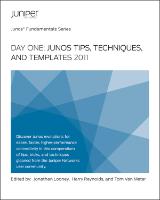 I am delighted to announce that earlier this week I was accepted into Juniper’s Ambassador program. To say that I am completely honored is an understatement. Working with Juniper’s products and technologies has been a labor of love for me dating back almost 18 years, since my first introduction to Junos back in early 1999 — as such, I am thrilled to join the ranks of my esteemed peers, whom I sincerely consider to be the best in the industry. A special thanks goes out to Andy Green, Director of Education Services Americas at Juniper Networks for nominating me and to the rest of the Juniper Ambassadors who apparently endorsed that nomination with a resounding yes. I look forward to seeing and collaborating with all of you on the J-Net Forums!
I am delighted to announce that earlier this week I was accepted into Juniper’s Ambassador program. To say that I am completely honored is an understatement. Working with Juniper’s products and technologies has been a labor of love for me dating back almost 18 years, since my first introduction to Junos back in early 1999 — as such, I am thrilled to join the ranks of my esteemed peers, whom I sincerely consider to be the best in the industry. A special thanks goes out to Andy Green, Director of Education Services Americas at Juniper Networks for nominating me and to the rest of the Juniper Ambassadors who apparently endorsed that nomination with a resounding yes. I look forward to seeing and collaborating with all of you on the J-Net Forums!
Juniper Networks Announces New Network Design Training Curriculum and Certification Program
Juniper took a big step forward in rounding out their certification programs by announcing a new Design Training and Certification curriculum, focusing on best practices and techniques that can be used across the spectrum of network architecture and design. Slated to be included in this program are also technologies around software-defined networking (SDN) and network functions virtualization (NFV).
Preparation Tips for the JNCIE-SEC Exam
Not a day that goes by since having passed the JNCIE-SEC exam that I don’t receive an inquiry in one form or another regarding how I prepared for the exam. It seems that there is an incredible amount of interest in this exam, especially from all those die-hard ScreenOS folks that are now converting to Junos. So instead of constantly repeating myself, I figured I’d just put it up on the blog so others can benefit (leaving me more time to do other things, ‘heh).
Juniper SRX Tips :: Altering Default-Deny Behavior
In our previous article, we looked at using apply-groups to alter all the security policies uniformly on an SRX device such that they would all have an implicit logging statement. And while this is fine for all existing policies, it doesn’t log traffic which doesn’t match any explicitly defined security policy.
The reason for this is due to the fact that in Junos, traffic which doesn’t match an explicitly defined security policy matches against the default-deny policy. However, given the fact that the default-deny policy is implicitly defined, apply-group configurations are of little benefit as apply-groups can only be inherited by those elements which have been explicitly defined. Continue reading “Juniper SRX Tips :: Altering Default-Deny Behavior”
Juniper SRX Tips :: Uniform Security Policy Modification
Often there are instances where we want to affect all security policies configured on an SRX device. For example, let’s say that we have thousands of policies configured on our firewall, and we want to enable logging for every single policy. Obviously this would take some time if we were to do this manually on each and every individual policy, so an easier way is desired.
Continue reading “Juniper SRX Tips :: Uniform Security Policy Modification”
JNCIE Tips from the Field :: Summarization Made Easy
Today we’ll start with a series of articles covering tips and techniques that might be utilized by JNCIE candidates, whether pursuing the JNCIE-SP, JNCIE-ENT, or even the JNCIE-SEC. The tips and techniques I will be covering might prove to be useful during a lab attempt but could also be used in real-world scenarios to save time and minimize configuration burden in addition to eliminating mistakes that might otherwise be made. I want everyone to understand that what I am about to write is simply a technique. I am not divulging any materials or topics which are covered under NDA.
Continue reading “JNCIE Tips from the Field :: Summarization Made Easy”Day One Guide: Junos Tips, Techniques, and Templates 2011
 I am happy to announce that Juniper has just released a new Day One Guide entitled “Junos Tips, Techniques, and Templates 2011“. For this particular Day One Guide, Juniper Networks Books and J-Net joined forces and requested the best and brightest Junos tips and techniques from the Junos user community. In fact, the book was created after a thorough selection process which included reviewing over 300 submitted tips by over 100 individuals on the J-Net community boards at forums.juniper.net.
I am happy to announce that Juniper has just released a new Day One Guide entitled “Junos Tips, Techniques, and Templates 2011“. For this particular Day One Guide, Juniper Networks Books and J-Net joined forces and requested the best and brightest Junos tips and techniques from the Junos user community. In fact, the book was created after a thorough selection process which included reviewing over 300 submitted tips by over 100 individuals on the J-Net community boards at forums.juniper.net.
Continue reading “Day One Guide: Junos Tips, Techniques, and Templates 2011”
